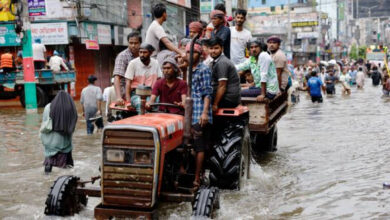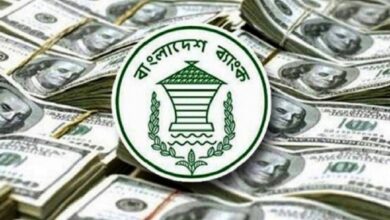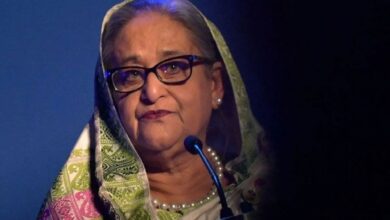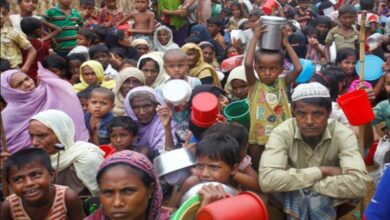‘Won’t join farcical vote’: Bangladesh opposition leader ahead of election
The Bangladesh Nationalist Party will boycott the January elections amid a deepening crisis for the country’s democracy.
![Protesters outside the office of the Election Commission of Bangladesh, in Dhaka, Bangladesh, November 15, 2023. The Bangladesh Nationalist Party, the country's main opposition party, is boycotting January elections [Mohammad Ponir Hossain/Reuters]](https://southasiancorrespondent.com/wp-content/uploads/2023/11/Bangladesh.webp)
By Snigdhendu Bhattacharya
A day before nominations end for Bangladesh’s January 7 parliamentary election, the country’s leading opposition party has confirmed that it will not participate in the vote, citing irregularities by Prime Minister Sheikh Hasina’s government.
Ruhul Kabir Rizvi, Senior Joint Secretary General of the Bangladesh Nationalist Party (BNP), told Al Jazeera there is “no chance of us participating in the election” until a key demand of the party is met. Thursday, November 30, is the last date for submission of nominations.
The BNP wants Hasina to step down and make way for a neutral caretaker government to conduct the election in a “free, fair and credible manner”.
While Hasina’s Awami League (AL) party has ruled that out, the government has also launched a crackdown on the BNP, with top functionaries and grassroots-level workers being jailed on a range of new and old cases, involving mainly violence and corruption. Many opposition leaders have gone into hiding.
The situation prompted the global non-profit, Human Rights Watch, to issue a strongly-worded statement on Monday, condemning the spate of arrests, and calling on Bangladesh’s “diplomatic partners” to act. HRW said “the government’s autocratic crackdown will jeopardise future economic cooperation”.
Ruhul Kabir Rizvi, the BNP’s Senior Joint Secretary General and currently its top leader outside jail (except those in exile), has been living away from home since the last week of October and announcing party programmes on social media from undisclosed locations.
Rizvi is the only top BNP leader who has remained visible over the past three weeks. Even though he did appear in a few street protests, he swiftly changed locations after such events.
An advocate by profession, Rizvi has faced arrest multiple times during Hasina’s rule since 2008 – in 2012, 2013 and 2022 – spending months behind bars.
Since the BNP’s October 28 mega protest, Rizvi has been named in two separate cases of violence registered at the Fatullah police station in Bangladesh’s Narayanganj district. The associated penal provisions would not allow him a quick bail.
Rizvi spoke to Al Jazeera over the telephone. Excerpts:
Al Jazeera: The window for filing nominations is almost over. Is there any chance you have a Plan B?
Ruhul Kabir Rizvi: There is no chance of us participating in the election unless the government agrees to our demand. We still hope good sense prevails in the government. If the prime minister steps down and the elections are held under a caretaker government, we are ready to participate.
Al Jazeera: Suppose the government does not agree and the election commission goes ahead with the next steps after November 30, what would you do?
Rizvi: We will continue to do what we are doing. Protests would intensify on the streets. People will be on the streets in even greater numbers. The public opposition to a farcical election process will isolate the government in the international sphere.
Al Jazeera: There is a question many are asking. Has the BNP hoped for a little too much from the international community in pressurising the Hasina government?
Rizvi: Were we dependent on international support, we would not have been on the streets. Our leaders and workers are braving all odds. The government is using state apparatus like the police and intelligence agencies to fill the jails with opposition leaders. Our leaders and workers are facing arrest, intimidation, and harassment on a daily basis. We can’t stay at home if we do not want to be arrested. But we have not fled the ground. We are not issuing appeals to the international community from any safe space. We are very much into the fight on the ground.
At the same time, the world is now called a village. People from every country get to know about what’s happening elsewhere. They form their opinions on global issues. We are appealing to the conscience of the democratic people of the world that they try to ensure a free, fair, participatory and credible election in Bangladesh. That’s all we are asking for.
Al Jazeera: Apart from the ruling party and its allies, both factions of the Jatiya Party (the third-largest party) appear set to contest the elections. Many smaller parties are entering the poll fray. Wouldn’t non-participation isolate the BNP?
Rizvi: This is what the ruling party has been arguing since 2014. That year, there was no election in 154 seats where their candidates won uncontested. The seats where a contest happened with their friendly forces recorded abysmally low voter turnout. People did not vote.
In 2018, we did participate but the ruling party did not allow suspected opposition voters to reach the polling stations. The polling was totally rigged and people gave it the name of Nishi Rater Nirbachon or the election in the dead of night. Even the international community knows it as the midnight election.
This will be yet another farcical election if held under the current government. The use of police and intelligence agencies shows the extent of politicisation of the administration. We will isolate ourselves from the masses if we take part it in, when everyone knows what is on the cards.
Al Jazeera: Are you really confident of staying relevant without participating in the election?
Rizvi: The experience of former President [Hussain Mohammed] Ershad’s dictatorial rule in the late 1980s shows us that staying with the people is more important than elections. Both Awami League and BNP had boycotted the 1988 election. We stayed on the streets, ensured a free and fair election, and the people brought us to power in 1991.
Al Jazeera: What would you do if the elections took place despite all your efforts and the Hasina government returned to power with a massive mandate?
Rizvi: That government would not last. It will collapse.
Al Jazeera: Several new parties have emerged in the electoral scene and it is being speculated that some of your party’s leaders and organisers may contest the elections on these parties’ tickets.
Rizvi: The government is trying to lure, intimidate and coax some leaders into contesting the elections. The police and intelligence agencies are being used for this purpose. These newly formed parties are the results of the government’s initiatives. The core BNP organisers will not go. Such initiatives were seen during Ershad’s rule as well. At that time, the term Jatiyo Beiman (national traitor) became popular to describe those contesting in farcical, one-sided elections. Those who now contest will earn the same moniker.
Al Jazeera: You have criticised China’s statement supporting the election as per Bangladesh’s Constitution. How do you look at India’s stance of describing the election as “Bangladesh’s domestic affair”?
Rizvi: India’s stance has hurt Bangladesh’s democratic people. They are upset with them for supporting an authoritarian and undemocratic regime. India should have valued Bangladesh’s public sentiments.
Al Jazeera: Do you have any further messages for the international community?
Rizvi: My appeal to the democratic forces in all countries is to play their part in ensuring a free, fair and credible election, and in ensuring that Bangladesh has the scope for free speech and universal human rights.
Election is only one aspect of the whole. The Cyber Security Act is being rampantly abused to silence critical voices, not just opposition parties. We want the world’s democratic forces to raise their voices for the restoration of democracy in Bangladesh.
SOURCE: AL JAZEERA




